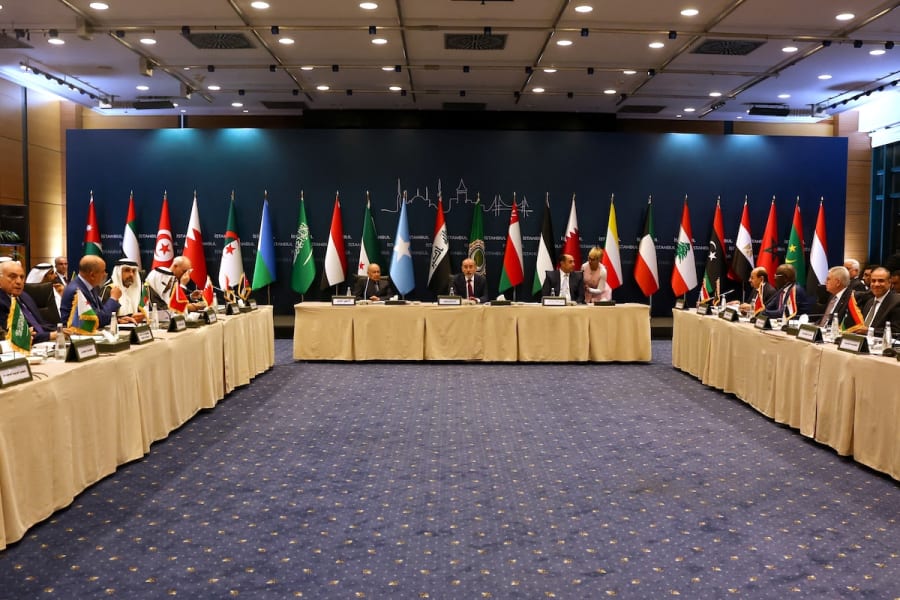Middle East nations unwilling to resettle Palestinian Arabs

Consider this extraordinary fact: Despite the plight of Palestinian Gazans, no Arab or Muslim country has offered to resettle them, even though 52 percent of these war-stricken people want to leave voluntarily, with some hoping to return at a later date. In a recent interview, Israeli Prime Minister Benjamin Netanyahu generated controversy over Egypt’s Rafah Border Crossing, a flashpoint following the Hamas-instigated war of 2023. Egypt is one of several Arab nations refusing to help.
Heated exchanges erupted after the popular Telegram channel Abu Ali Express interviewed Prime Minister Netanyahu on September 5. Netanyahu accused Egypt of “imprisoning against their will residents in Gaza who want to leave a war zone.” His criticism was pointed. For years the Rafah Crossing, the southernmost passage between Gaza and Egypt, was an active route for smuggled goods. Netanyahu said he was willing to allow Gazans to leave through Rafah but explained that they “would then be blocked by Egypt.”
Egyptian Foreign Minister Badr Abdelatty reacted with “utmost condemnation,” declaring, “Displacement is not an option and we will not allow it to happen.” He claimed there was “no legal or moral or ethical ground to evict people from their homeland.” Abdelatty then accused Israel of “committing genocide,” a false claim perpetuated by Hamas propaganda and embraced by millions. Meanwhile, for nearly two years, Egypt has known that thousands of semitrucks carrying tons of food were allowed into Gaza, though at times Egypt blocked their passage. Distribution of food aid has been obstructed by both Hamas and the United Nations. Hamas steals food at gunpoint, while UN agencies responsible for distribution often abandon the cargo, leaving it to spoil in the sun.
Hamas operates without conscience, fostering violence and chaos against its own population as well as against Jews and others who oppose its extremist agenda. Palestinians are used as human shields, and Hamas prevents much of the population from receiving international food aid worth billions of dollars. Why such waste? It serves Hamas’s propaganda. They starve Palestinians, then blame Israel. This is one of their most destructive strategies. The reality is that the Israel Defense Forces are the only military in the world that warns civilians before attacks. Yet these warnings give Hamas time to prepare ambushes, costing IDF soldiers more lives. Humanitarian aid intended for civilians is instead stolen by Hamas, which then resells it at enormous profit to the very people it is meant to help.
The warrior King David wrote in Psalm 34:14, “Turn from evil and do good; seek peace and pursue it.” The regimes that hate Jews do not embrace peace. Israel has pursued peace countless times, yet to no avail. Today Israel fights for peace not only for itself but for the free world.
The 1979 peace agreement between Egypt and Israel still influences regional policy. Yet little criticism is directed at Egypt’s Rafah Crossing, as the media routinely blame Israel instead. Gaza shares borders only with Israel and Egypt. Both countries closed their crossings in 2006 and 2007. Egypt’s fortified wall along the Gaza border is not new, but in February 2024 satellite images revealed that Egypt quietly began strengthening it. A massive 16-foot-high wall, reinforced with steel and concrete and extending 18 feet underground to block tunnels, was built around its eight-square-mile buffer zone. The wall is also equipped with electronic sensors.
Egypt’s refusal to resettle Palestinians stems largely from national security concerns. Hamas, founded in 1987 as an offshoot of Egypt’s Muslim Brotherhood, has long threatened the region with violence. Egypt, the United States, and the European Union classify Hamas as a terrorist organization. Yet when Israel points to the same facts, the mainstream media and the United Nations often ignore or distort the truth about the world’s only Jewish homeland.
UN High Commissioner for Refugees Filippo Grandi has supported Egypt’s refusal, warning that resettling Gazans in Egypt would be “catastrophic” for both parties. Egypt also fears that Gazans would remain permanently. While the UN calls resettlement catastrophic, it continues to promote the two-state solution, which would be catastrophic for Israel. Recent violence illustrates the reality: two Palestinian terrorists from the West Bank murdered six Israelis at a bus stop near Jerusalem. For Israel, the two-state solution is no longer a viable option.
Egypt’s refusal is echoed by Jordan, Turkey, and Qatar. Although Algeria and Kuwait support Hamas politically, they too have offered no resettlement. The United Arab Emirates has shown compassion by building a city for medical treatment and offering temporary sanctuary for injured Gazans, but it firmly rejects permanent resettlement. Why do Arab nations refuse? History provides the answer. Under Yasser Arafat, the Palestinian Liberation Organization was expelled from Jordan, Lebanon, Syria, and Tunisia for spreading chaos and terror. The same patterns continue today under Mahmoud Abbas’s Palestinian Authority and Hamas.
The reality is clear. Any attempt by Arab nations, or by Israel, to resettle Palestinians invites the risk of instability and disaster.
This article originally appeared here and is reposted with permission.

A speaker and consultant, Arlene Bridges Samuels authors the weekly feature column for The Christian Broadcasting Network/Israel on their Facebook and Blog since 2020. Previously she pioneered Christian outreach for the American Israel Public Affairs Committee (AIPAC). Retiring after nine years, she worked part-time for International Christian Embassy Jerusalem USA as Outreach Director for their project, American Christian Leaders for Israel (ACLI) Arlene is an author at The Blogs-Times of Israel, often traveling to Israel since 1990. By invitation she attends the Israel Government Press Office (GPO) Christian Media Summits as a recognized member of Christian media worldwide. Read more of her articles at CBN Israel blog. Arlene and her husband Paul Samuels have coauthored a book, Mental Health Meltdown, illuminating the voices of bipolar and other mental illnesses. On Amazon













